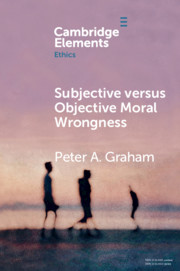Refine search
Actions for selected content:
2 results
Chapter 9 - Sidgwick
- from Part IV - Victorian Anti-naturalism
-
- Book:
- Modern Moral Philosophy in the Nineteenth Century
- Published online:
- 15 November 2025
- Print publication:
- 30 October 2025, pp 247-270
-
- Chapter
- Export citation

Subjective versus Objective Moral Wrongness
-
- Published online:
- 20 March 2021
- Print publication:
- 15 April 2021
-
- Element
- Export citation
